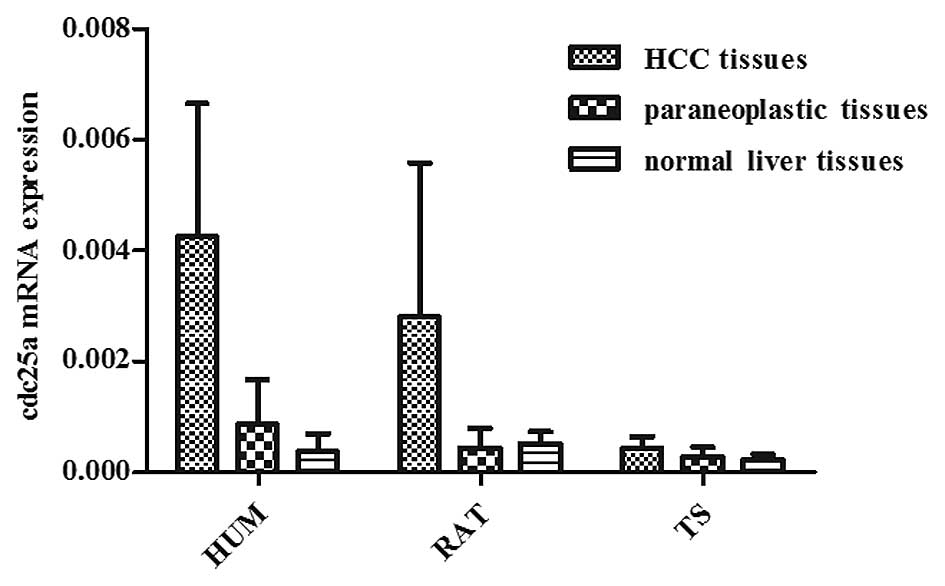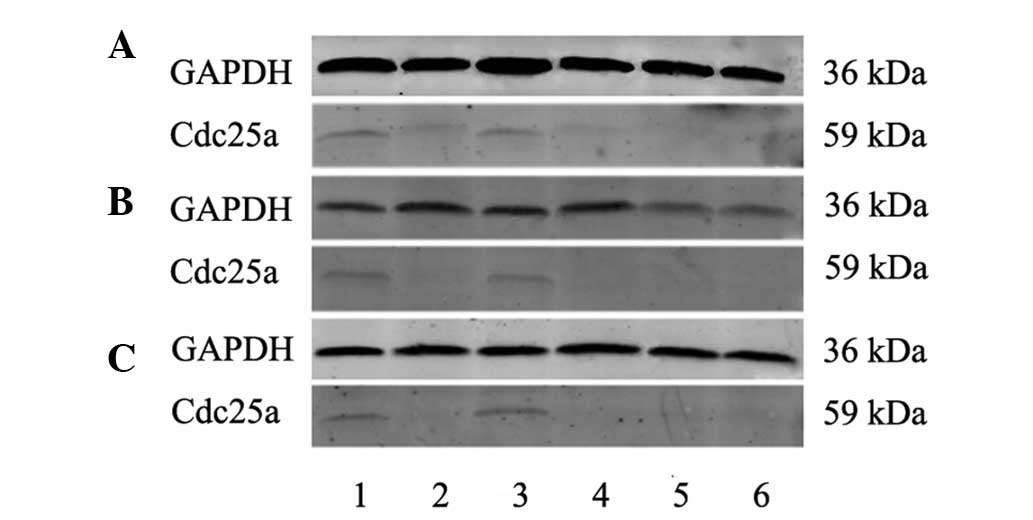|
1
|
Waly Raphael S, Yangde Z and Yuxiang C:
Hepatocellular carcinoma: Focus on different aspects of management.
ISRN Oncol. 2012:4216732012.PubMed/NCBI
|
|
2
|
Beroukhim R, Mermel CH, Porter D, Wei G,
Raychaudhuri S, Donovan J, Barretina J, Boehm JS, Dobson J,
Urashima M, et al: The landscape of somatic copy-number alteration
across human cancers. Nature. 463:899–905. 2010. View Article : Google Scholar : PubMed/NCBI
|
|
3
|
Mattison J, Kool J, Uren AG, de Ridder J,
Wessels L, Jonkers J, Bignell GR, Butler A, Rust AG, Brosch M, et
al: Novel candidate cancer genes identified by a large-scale
cross-species comparative oncogenomics approach. Cancer Res.
70:883–895. 2010. View Article : Google Scholar : PubMed/NCBI
|
|
4
|
Mootha VK, Lindgren CM, Eriksson KF,
Subramanian A, Sihag S, Lehar J, Puigserver P, Carlsson E,
Ridderstråle M, Laurila E, et al: PGC-1alpha-responsive genes
involved in oxidative phosphorylation are coordinately
downregulated in human diabetes. Nat Genet. 34:267–273. 2003.
View Article : Google Scholar : PubMed/NCBI
|
|
5
|
Greenbaum D, Jansen R and Gerstein M:
Analysis of mRNA expression and protein abundance data: An approach
for the comparison of the enrichment of features in the cellular
population of proteins and transcripts. Bioinformatics. 18:585–596.
2002. View Article : Google Scholar : PubMed/NCBI
|
|
6
|
Deng YB, Nagae G, Midorikawa Y, Yagi K,
Tsutsumi S, Yamamoto S, Hasegawa K, Kokudo N, Aburatani H and
Kaneda A: Identification of genes preferentially methylated in
hepatitis C virus-related hepatocellular carcinoma. Cancer Sci.
101:1501–1510. 2010. View Article : Google Scholar : PubMed/NCBI
|
|
7
|
Liao YJ, Liu SP, Lee CM, Yen CH, Chuang
PC, Chen CY, Tsai TF, Huang SF, Lee YH and Chen YM:
Characterization of a glycine N-methyltransferase gene knockout
mouse model for hepatocellular carcinoma: Implications of the
gender disparity in liver cancer susceptibility. Int J Cancer.
124:816–826. 2009. View Article : Google Scholar
|
|
8
|
Khetchoumian K, Teletin M, Tisserand J,
Mark M, Herquel B, Ignat M, Zucman-Rossi J, Cammas F, Lerouge T,
Thibault C, et al: Loss of Trim24 (Tif1alpha) gene function confers
oncogenic activity to retinoic acid receptor alpha. Nat Genet.
39:1500–1506. 2007. View Article : Google Scholar : PubMed/NCBI
|
|
9
|
Viatour P and Sage J: Mouse HCC model.
http://www.ncbi.nlm.nih.gov/geo/query/acc.cgi?acc=GSE19004.
Accessed Jul 28, 2012.
|
|
10
|
Sheth SS, Bodnar JS, Ghazalpour A,
Thipphavong CK, Tsutsumi S, Tward AD, Demant P, Kodama T, Aburatani
H and Lusis AJ: Hepatocellular carcinoma in Txnip-deficient mice.
Oncogene. 25:3528–3536. 2006. View Article : Google Scholar : PubMed/NCBI
|
|
11
|
Li Y, Wan DF, Su JJ, Cao J, Ou C, Qiu XK,
Ban KC, Yang C, Qin LL, Luo D, et al: Differential expression of
genes during aflatoxin B(1)-induced hepatocarcinogenesis in tree
shrews. World J Gastroenterol. 10:497–504. 2004. View Article : Google Scholar : PubMed/NCBI
|
|
12
|
Sobin LH and Compton CC: TNM seventh
edition: what's new, what's changed: communication from the
International Union Against Cancer and the American Joint Committee
on Cancer. Cancer. 116:5336–5339. 2010. View Article : Google Scholar : PubMed/NCBI
|
|
13
|
Li Y, Qin X, Cui J, Dai Z, Kang X, Yue H,
Zhang Y, Su J, Cao J, Ou C, et al: Proteome analysis of aflatoxin
B1-induced hepatocarcinogenesis in tree shrew (Tupaia belangeri
chinensis) and functional identification of candidate protein
peroxiredoxin II. Proteomics. 8:1490–1501. 2008. View Article : Google Scholar : PubMed/NCBI
|
|
14
|
Hao YR, Yang F, Cao J, Ou C, Zhang JJ,
Yang C, Duan XX, Li Y and Su JJ: Ginkgo biloba extracts (EGb761)
inhibits aflatoxin B1-induced hepatocarcinogenesis in Wistar rats.
Zhong Yao Cai. 32:92–96. 2009.In Chinese. PubMed/NCBI
|
|
15
|
Li Y, Su JJ, Qin LL, Egner PA, Wang J,
Groopman JD, Kensler TW and Roebuck BD: Reduction of aflatoxin B1
adduct biomarkers by oltipraz in the tree shrew (Tupaia belangeri
chinensis). Cancer Lett. 154:79–83. 2000. View Article : Google Scholar : PubMed/NCBI
|
|
16
|
Gentleman RC, Carey VJ, Bates DM, Bolstad
B, Dettling M, Dudoit S, Ellis B, Gautier L, Ge Y, Gentry J, et al:
Bioconductor: Open software development for computational biology
and bioinformatics. Genome Biol. 5:R802004. View Article : Google Scholar : PubMed/NCBI
|
|
17
|
Irizarry RA, Hobbs B, Collin F,
Beazer-Barclay YD, Antonellis KJ, Scherf U and Speed TP:
Exploration, normalization, and summaries of high density
oligonucleotide array probe level data. Biostatistics. 4:249–264.
2003. View Article : Google Scholar : PubMed/NCBI
|
|
18
|
Gautier L, Cope L, Bolstad BM and Irizarry
RA: Affy-analysis of affymetrix GeneChip data at the probe level.
Bioinformatics. 20:307–315. 2004. View Article : Google Scholar : PubMed/NCBI
|
|
19
|
Kanehisa M and Goto S: KEGG: Kyoto
encyclopedia of genes and genomes. Nucleic Acids Res. 28:27–30.
2000. View Article : Google Scholar
|
|
20
|
Liang HJ, Wei W, Kang XN, Guo K, Cao J, Su
JJ, Yang C, Ou C, Li Y and Liu YK: Differentially expressed
proteins in the precancerous stage of rat hepatocarcinogenesis
induced by diethylnitrosamine. Chinese Journal of Hepatology.
17:669–674. 2009.In Chinese.
|
|
21
|
MacDonald JW and Ghosh D: COPA-cancer
outlier profile analysis. Bioinformatics. 22:2950–2951. 2006.
View Article : Google Scholar : PubMed/NCBI
|
|
22
|
Subramanian A, Kuehn H, Gould J, Tamayo P
and Mesirov JP: GSEA-P: A desktop application for gene set
enrichment analysis. Bioinformatics. 23:3251–3253. 2007. View Article : Google Scholar : PubMed/NCBI
|
|
23
|
Takashima S, Saito H, Takahashi N, Imai K,
Kudo S, Atari M, Saito Y, Motoyama S and Minamiya Y: Strong
expression of cyclin B2 mRNA correlates with a poor prognosis in
patients with non-small cell lung cancer. Tumour Biol.
35:4257–4265. 2014. View Article : Google Scholar : PubMed/NCBI
|
|
24
|
Gao SY, Li J, Qu XY, Zhu N and Ji YB:
Downregulation of Cdk1 and cyclinB1 expression contributes to
oridonin-induced cell cycle arrest at G2/M phase and growth
inhibition in SGC-7901 gastric cancer cells. Asian Pac J Cancer
Prev. 15:6437–6441. 2014. View Article : Google Scholar : PubMed/NCBI
|
|
25
|
Li T, Zhao X, Mo Z, Huang W, Yan H, Ling Z
and Ye Y: Formononetin promotes cell cycle arrest via
downregulation of Akt/Cyclin D1/CDK4 in human prostate cancer
cells. Cell Physiol Biochem. 34:1351–1358. 2014. View Article : Google Scholar : PubMed/NCBI
|
|
26
|
Xu X, Yamamoto H, Sakon M, Yasui M, Ngan
CY, Fukunaga H, Morita T, Ogawa M, Nagano H, Nakamori S, et al:
Overexpression of CDC25A phosphatase is associated with hypergrowth
activity and poor prognosis of human hepatocellular carcinomas.
Clin Cancer Res. 9:1764–1772. 2003.PubMed/NCBI
|
|
27
|
Liu L, Schwartz B, Tsubota Y, Raines E,
Kiyokawa H, Yonekawa K, Harlan JM and Schnapp LM: Cyclin-dependent
kinase inhibitors block leukocyte adhesion and migration. J
Immunol. 180:1808–1817. 2008. View Article : Google Scholar : PubMed/NCBI
|
|
28
|
Brunetto E, Ferrara AM, Rampoldi F,
Talarico A, Cin ED, Grassini G, Spagnuolo L, Sassi I, Ferro A,
Cuorvo LV, et al: CDC25A protein stability represents a previously
unrecognized target of HER2 signaling in human breast cancer:
Implication for a potential clinical relevance in trastuzumab
treatment. Neoplasia. 15:579–590. 2013. View Article : Google Scholar : PubMed/NCBI
|
|
29
|
Younis RH, Cao W, Lin R, Xia R, Liu Z,
Edelman MJ, Mei Y, Mao L and Ren H: CDC25A (Q110del): A novel cell
division cycle 25A isoform aberrantly expressed in non-small cell
lung cancer. PLoS One. 7:e464642012. View Article : Google Scholar
|
|
30
|
Huang MY, Wang JY, Chang HJ, Kuo CW, Tok
TS and Lin SR: CDC25A, VAV1, TP73, BRCA1 and ZAP70 gene
overexpression correlates with radiation response in colorectal
cancer. Oncol Rep. 25:1297–1306. 2011.PubMed/NCBI
|
|
31
|
Chiu YT, Han HY, Leung SC, Yuen HF, Chau
CW, Guo Z, Qiu Y, Chan KW, Wang X, Wong YC and Ling MT: CDC25A
functions as a novel Ar corepressor in prostate cancer cells. J Mol
Biol. 385:446–456. 2009. View Article : Google Scholar
|
|
32
|
Xu X, Yamamoto H, Liu G, Ito Y, Ngan CY,
Kondo M, Nagano H, Dono K, Sekimoto M and Monden M: CDC25A
inhibition suppresses the growth and invasion of human
hepatocellular carcinoma cells. Int J Mol Med. 21:145–152.
2008.PubMed/NCBI
|
|
33
|
Liu T, Yu X, Li G, Yuan R, Wang Q, Tang P,
Wu L, Liu X, Peng X and Shao J: Rock2 regulates Cdc25A through
ubiquitin proteasome system in hepatocellular carcinoma cells. Exp
Cell Res. 318:1994–2003. 2012. View Article : Google Scholar : PubMed/NCBI
|
















